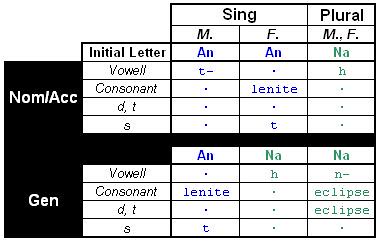Eventually, every student who decides to learn Irish is presented with the choice of which dialect to study. Will it be Munster-, Connemara- or Ulster-Irish? Or will it be the Caighdeán Oifigiúil (an artificially constructed “Standard Irish”) which would seem to have the advantage of a neutral, dialect-agnostic grammar and vocabulary, but is also apparently somewhat viscerally rejected by exponents of each dialect.
Perhaps the greatest splash of cold water in the student’s face is the degree to which internecine fighting among exponents of each dialect gets personal and nasty, as if every speaker of a different dialect is single-handedly responsible for the demise of Irish in Ireland, and every speaker’s own dialect can rightfully lay claim to the purest, most unadulterated form of Irish currently spoken.
Interestingly, the Irish-on-Irish insults hurled against speakers of dialects other than one’s own seem to be conducted as frequently in English as they are in Irish. I’ll leave it up to you to decide what this says about the current state of affairs. Far be it from me to say it’s reminiscent of a bucket full of crabs.
For my part, I elected at long last to study Connemara Irish because the study-aid best suited to my learning style teaches that dialect. I was also fortunate in that my family hails from that area of Ireland, so there was that additional incentive to learn Connemara Irish.
Imagine my surprise when one disgruntled student of Connemara Irish claimed that he’d supposedly “wasted” a year learning it and had since gone on to learn the supposedly purer Munster dialect. Apparently, the retention of certain older genitive verb-forms, considered antiquated in Connemara but still extant in Munster, qualified Muster as a “realer McCoy.” In fact, to hear him say it, Connemara Irish was to Irish what Ebonics is to US English.
I don’t know what to make of this. I keep coming back inexorably to the fact that, after many moons studying this language on my own, my American ears discern no differences among dialects that supposedly make one sound trashier or more refined to another, let alone make them mutually unintelligible. I have a Pimsleur course based entirely on Munster Irish and the greatest difference I can discern from it is that Munster Irish:
- Is melodious in a way that Connemara Irish is not;
- Pronounces the “s” in “anseo” and “ansin” as a pure “s” instead of a “sh” sound;
- Pronounces lenited consonants marginally differently.
Kill me if I don’t think the Spanish Irish Inquisition is called for here.
 I really should give this a mention here.
I really should give this a mention here.


